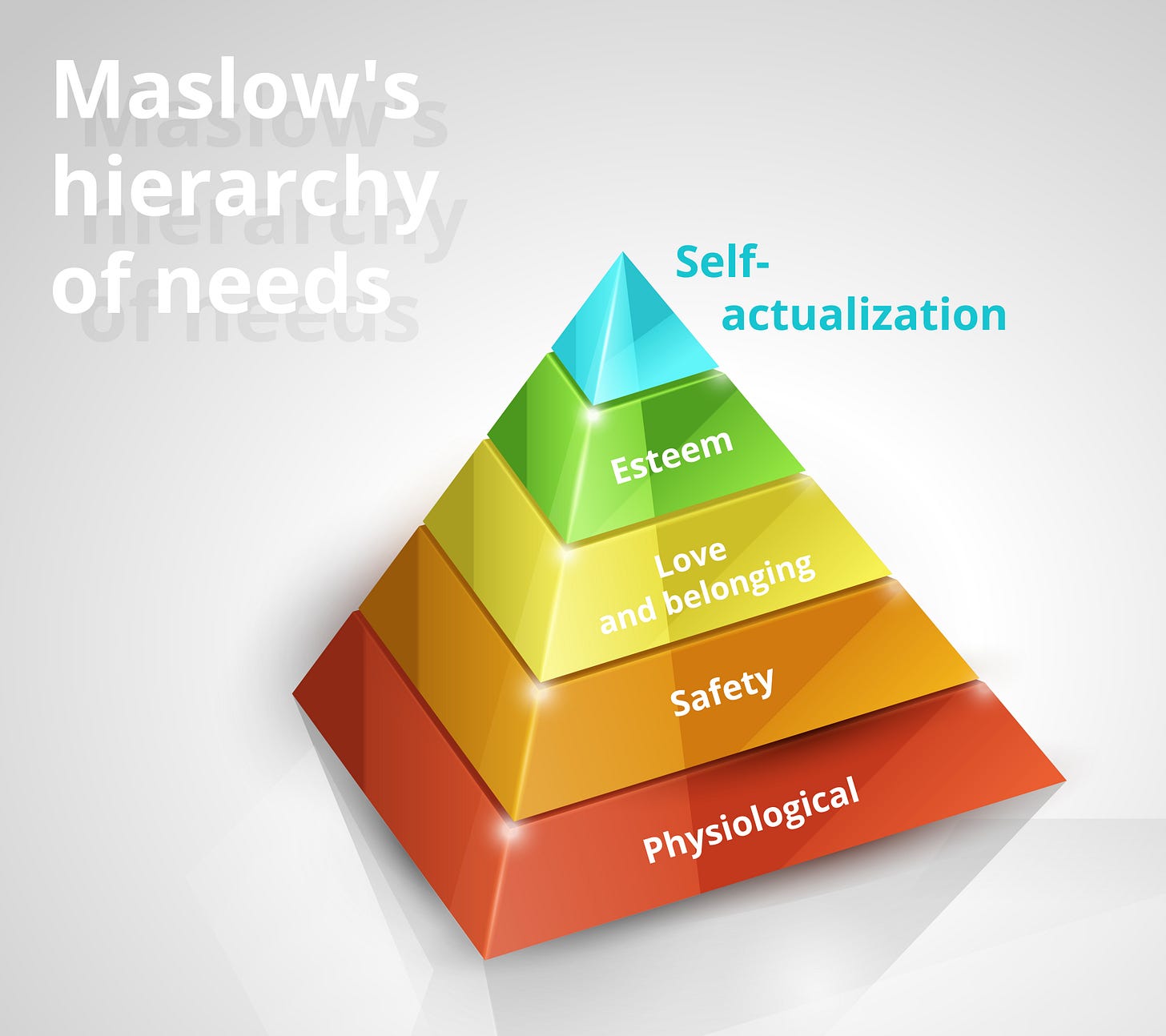Finding Meaning: Two Life Paths
If you don’t want life to define you, then you need to define it for yourself.
Dear Reader,
In this first article I introduce two paths to a meaningful life and discuss how we might apply them to our lives today. I touch on several themes and traditions that I’ll cover more deeply in future posts. It ties together some ideas I find interesting and useful.
Humans are wired for meaning. We’re probably the only meaning-making species on the planet. We constantly weave narratives about our lives, both consciously and unconsciously. In the words of Joseph Campbell:
“Each entered the forest at a point that he himself had chosen, where it was darkest and there was no path. Where there’s a way or path, it is someone else's path. You are not on your own path; each human being is a unique phenomenon.”
Campbell, Goddesses: Mysteries of the Feminine Divine
If we don’t want life to define us, then we need to define it for ourselves.
However, writing our own story is harder than it might seem. Most of the time, we live on autopilot. Wake up, shower, grab breakfast, drop kids, go to work… Our lives become a comfortable yet meaningless routine, where each day looks the same as the one that came before.
But meaning does matter. Psychologists tell us it’s an important part of flourishing. In Seligman’s PERMA theory, the M stands for Meaning, making it one of five components of well-being.
And there’s another reason why we should care about meaning. Having a purpose keeps us centered. For those of us who tend towards introspection, we can easily get lost in a mire of concepts and beliefs. A strong sense of what matters is a powerful counterbalance to the over-thinking mind.
Finally, meaning gives us a reason to keep going, even when life challenges us. Here’s what Nietzsche had to say about the topic:
“He who has a why to live for can bear almost any how”
Nietzsche, Twilight of the Idols
Path #1: Personal Growth
The first path centers on you as an individual. All living entities have an urge to grow. A seed becomes a sapling and then a tree. A caterpillar transforms into a butterfly. Humans follow their own complex developmental path.

Babies move through a series of physical milestones: roll, crawl, walk. Our brains also develop in stages, from basic motor skills to deductive reasoning. Human children are designed for growth. And it doesn’t stop when we reach adulthood.
The pursuit of personal growth has been popularized by the self-help movement. However, its roots are ancient.
Aristotle, building on the work of Socrates and Plato, taught that developing virtue was central to human flourishing. The stoics also held that a virtuous life was a meaningful one. For these ancient philosophers, the focus of a well-lived life was the development of your character.
Religious traditions provide us with an image of the perfected human. Jesus Christ and the enlightened Buddha are two obvious examples. Of course, achieving some ultimate state of perfection is not attainable for most of us. But this is not the point.
Buddhahood, sainthood, stoic sage… these are ideals to aim for. A noble path to follow. Inspiration to help us live full and meaningful lives.
In the modern and post-modern world, the desire for growth is often channeled into the pursuit of external things. For example, the acquisition of wealth or status. To further tempt us, culture offers shiny examples of what is possible. This time, in the form of glamorous movie stars or flashy billionaires.
Desiring external things is understandable and necessary. We all experience a stage of acquisition where we must provide for ourselves and our families. Attending to our physical needs and desires can also provide meaning – at least for a while.
But for some, the path of growth calls us back to something ese. A striving to fulfil our potential as human beings. This insight was best communicated by Maslow in his hierarchy of needs. His framework suggests that human motivation stems from a hierarchy of five categories: physiological, safety, love, esteem, and self-actualization.

One way to see the personal growth path is that it’s an evolution in how you orient yourself. All religions and secular traditions offer practices to help you do this, for example through meditation, prayer, community, self-reflection, confession, etc.
This path does not exclude practical goals. But instead of fixing on a desired endpoint or achievement, you focus on how you show up in your life. It’s a path of self transformation.
Path #2: Being Part Of Something Bigger
The first path is individualistic. It’s about developing yourself, whether in virtue, consciousness, or material things. The second path considers your life in relation to a greater whole.
Just as we’re wired for growth, we also have a need for connection. We find meaning in our relationships with others, by contributing to something we find significant, or from embracing our place in the Universe.
As an introvert, I savor my alone time. Yet I’m also keenly aware of the need to connect. I recall how isolating it felt to shelter at home during the Covid pandemic. The experience leant greater meaning to every interaction I had with neighbors and my local community. During that time, I developed immense gratitude for the people in my life and for time outdoors in nature.
As with the first, the specifics of this path vary across traditions. Some people find meaning through connection to God, the Cosmos, or Nature. Others may spotlight their role within a community or family. For example, the Abrahamic religions speak of connection to God and God’s people. Doaism and Stoicism encourage harmony with the Natural Order. While Aristotlean ethics and Confucianism emphasize duty to society.
In Mahāyāna Buddhism, a bodhisattva seeks to attain Buddhahood not for personal reasons, but to benefit all beings. The heart of the bodhisattva is one of compassion and a desire to alleviate all suffering.
This giving of oneself to others is beautifully expressed by Shantideva in The way of the bodhisattva as follows:
“My body, thus, and all my goods besides,
And all my merits gained and to be gained,
I give them all and do not count the cost,
To bring about the benefit of beings.
Nirvana is attained by giving all,
Nirvana is the object of my striving;
And all must be surrendered in a single instant,
Therefore it is best to give it all to others.”
I’m not suggesting that we all pursue a path of complete self-sacrifice. I suspect this is beyond all but a few. However, there’s an important question here. What is the point of personal striving, unless it is for the benefit of more than just ourselves?
Your Meaningful Life
By now, you may have realized two things. First, both paths are flexible. They can each be adapted to suit your personal beliefs and stage of life.
It’s only natural that a recent graduate is motivated to acquire skills that will land them a good job. Whereas someone who has a measure of worldly security will have different priorities. Each of us must follow our own path and will no doubt encounter multiple forks in the road, where we leave one way and join another.
The second takeaway is that following just one of the two paths can lead you astray. For example, if your focus is self-development, your viewpoint can narrow until the goal becomes everything. Your life becomes small, and attaining your purpose loses its meaning. Personal growth becomes just another form of external achievement. A box to be checked, before you move on to the next thing.
While exclusively following the second path, can lead to a type of hive mind (think of the Borg in Star Trek). You risk becoming swallowed by something larger, which may not be of your choosing. This can be the parent who sacrifices their dreams for their family, ultimately harming themselves and their children. Or the seeker who falls prey to a cult, losing touch with their relationships and creative pursuits.
So, where does this leave us? It seems to me that a meaningful life is both fluid and balanced. It’s ever-changing and incorporates elements from both paths.
I like to think of path one as how we are in the world and path two as why we are.
We humans are gifted with long life spans. And it is up to us to decide what we do with our time. Unlike most of the animal kingdom, we live well beyond the ability to procreate and raise children. We also have a unique capacity to be self-aware. But for what purpose?
One possible answer is that we’re meant to keep evolving. And in doing so, share what we learn with those around us. Perhaps this is our human destiny and what makes our lives meaningful.



I’m so happy to see you back! Can’t wait to read what you’ve got to share!
So glad to see this next chapter in your strivings and focus. Write on!